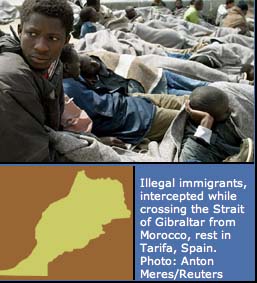Men and women are exploited once smuggled in Europe, children trafficked internally for domestic servitude.
Type: Source and Transit Country
Background
Located in North Africa with a coastline of the Mediterranean, Morocco is separated from the wealthier European country of Spain by the Strait of Gibraltar (at its narrowest point the two countries are only eight miles apart). Many smuggling rings take advantage of the short distance to transport Moroccans and other Africans to Europe. The trip, however, is risky: According to BBC NEWS, more than 3,000 have died in the past decade while attempting to make the trip across. The 2,000 people who make the crossing every month are at risk of becoming trafficking victims.
Victims
According to the U.S. State Department, some Moroccans seeking work in Europe and the Middle East as domestic servants or in the hotel or construction industry have been forced into situations of coerced labor, narcotics trafficking, or commercial sexual exploitation. In November 2002 the press uncovered a trafficking network in which young women paid $2,000 for work contracts in Jordan, and upon arrival they were forced into prostitution. A month earlier nine people were arrested in Casablanca for offering fraudulent work contracts to Europe for $4,000. Similar scams were reported in 1999 where the women were brought to Persian Gulf states. There are also reports that some who transit from West African countries through Morocco to Europe are trafficked.
Internal trafficking of children from rural areas to cities for domestic servitude is widespread. Parents of rural children contract their daughters as child maids to wealthier urban families. According to a 2001 UNICEF-funded study there are more than 13,000 girls younger than 15 working as child maids in Casablanca alone, while the International Labor Organization estimates that there are 50,000 all over Morocco. Many of these child domestic workers are subjected to psychological and physical abuse. One report claimed that four percent of the girls are sexually abused.
Counter-Trafficking Efforts
In 2001, tensions between Spain and Morocco increased as government officials on each side blamed the other country for smuggling and trafficking problems in the region. Spain accused Morocco of not doing enough to limit the illegal activities, while Morocco claimed that Spanish mafia gangs were responsible for the increase in the number of illegal immigrants who tried to enter Spain by boat from Morocco. These days Spain has set up a network of sensors and cameras along the coast to intercept illegal migrants.
Morocco, according to the U.S. State Department, is trying to do its part. Although the country has no laws against trafficking, the government uses statutes that cover kidnapping and forced prostitution to prosecute traffickers. Law enforcement agencies actively investigate, prosecute, and convict traffickers. In one instance a Belgian diplomat was arrested for recruiting Moroccan women to work in Belgian nightclubs. Saudi Arabian and Moroccan police forces have also worked together to break up a trafficking ring made up of 40 members. The government has conducted a crackdown on corrupt public officials who have taken bribes from traffickers.
In 2000 a UNICEF- and government-funded national campaign was initiated against the employment of child domestic workers. The goal of the campaign was to return abused child maids to their families when possible or place them in shelters.



